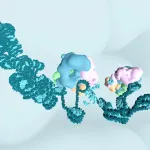(Press-News.org) A 'biological age' score predicts that being male, overweight, a smoker and having depression all contribute to biological aging, a study published today in eLife reports.
Aging can be measured in different ways. While chronological age is measured by date of birth, scientists have developed a range of measurements to determine our biological age. These include measuring the length of telomeres (little caps on the end of our chromosomes that shorten as we grow older), chemical changes to our DNA (epigenetics), and changes to the proteins and metabolites in our bodies (proteomic and metabolomic measures).
Although studies have linked these individual measurements to physical and mental health, it is not known whether they influence each other - or whether they have a cumulative effect on our overall well being as we age. This new research is the first to combine these individual measurements of biological age and show how they link with mental and physical health.
"To develop a better understanding of the mechanisms underlying biological aging, we wanted to examine how indicators of biological aging relate to each other, how they link to determinants of physical and mental health, and whether a combined biological clock, made up of all age indicators is a better predictor of health," explains lead author Rick Jansen, Assistant Professor at the Department of Psychiatry, Amsterdam UMC, the Netherlands.
The team used blood samples from nearly 3,000 people taking part in the Netherlands Study of Depression and Anxiety. They applied computer modelling to create individual biological aging indicators based on five commonly used measurements: telomere length, epigenetics, gene levels, metabolites and proteomics. The five indicators were then linked back to different factors such as sex, lifestyle factors and known physical and mental disorders such as depression.
Of the five biological aging indicators, only three were found to significantly interact in individuals, such that an increase in one indicator also paralleled an increase in the other. There were many overlapping and distinct links between particular aging indicators and specific lifestyle factors or diseases. But being male, having a high body mass index (BMI), smoking and having metabolic syndrome were most consistently linked with more advanced biological aging.
The team also confirmed that depression was linked to more advanced aging measured by epigenetics, gene levels and proteomics. This suggests that biological aging is linked to both mental and physical health.
When they combined all five measures into a composite score of biological age, they found more and stronger associations for the composite score than for each individual biological aging indicator. This composite score had greater associations with BMI, sex, smoking, depression severity and metabolic syndrome, highlighting the interplay between different systems on cumulative biological aging.
"Our work suggests that biological aging indicators largely track distinct, but partially overlapping, aspects of the aging process," concludes senior author Brenda Penninx, Professor of Psychiatric Epidemiology at the Department of Psychiatry, Amsterdam UMC. "Taken together, our findings contribute to the understanding and identification of biological age determinants - important for the development of outcomes for clinical and population-based research."
INFORMATION:
This study has been published as part of eLife's special issue on aging, geroscience and longevity. To view the special issue, visit https://elifesciences.org/collections/6d673315/aging-geroscience-and-longevity-a-special-issue.
Media contact
Emily Packer,
Media Relations Manager
eLife
e.packer@elifesciences.org
01223 855373
About eLife
eLife is a non-profit organisation created by funders and led by researchers. Our mission is to accelerate discovery by operating a platform for research communication that encourages and recognises the most responsible behaviours. We aim to publish work of the highest standards and importance in all areas of biology and medicine, including Cell Biology and Genetics and Genomics, while exploring creative new ways to improve how research is assessed and published. eLife receives financial support and strategic guidance from the Howard Hughes Medical Institute, the Knut and Alice Wallenberg Foundation, the Max Planck Society and Wellcome. Learn more at https://elifesciences.org/about.
To read the latest Cell Biology research published in eLife, visit https://elifesciences.org/subjects/cell-biology.
And for the latest in Genetics and Genomics, see https://elifesciences.org/subjects/genetics-genomics.
According to the Education Act, schools in the ethnically divided Bosnia and Herzegovina must teach students "democratic ideals in a multicultural society." But according to new research from the University of Copenhagen, the opposite happens: Segregated schools perpetuate ethnic divisions between Croats, Serbs and Bosniaks, making reconciliation after the 1992-1995 wars extremely difficult.
25 years ago, the warring factions in the war in former Yugoslavia signed a peace agreement. Bosnia and Herzegovina, where 100,000 people lost their lives during the war, is now an independent state comprising the Bosnian-Croatian Federation and the Republika Srpska. It is a division that ...
Social conflicts, from policy debates to family disagreements, can easily devolve into angry words and personal attacks. Such heated confrontations, however, seldom resolve disagreements and can entrench opposing views.
A better approach to resolving interpersonal disagreements is to embrace characteristics that psychological scientists associate with wisdom, like intellectual humility, diverse viewpoints, and open-mindedness.
But applying these elements of wisdom can be difficult, especially during confrontations. The trick, according to new research published ...
The global problem of unowned domestic cats, driven by the cats' phenomenal reproductive success, carries significant economic, animal welfare and biodiversity costs. Big-data research led by an expert on veterinary medicine and infectious diseases at City University of Hong Kong (CityU) has found that although more than 80% of cats in Australia were desexed, only a fraction have had surgery before reaching puberty, thus creating a "pregnancy gap". To close this gap and prevent unwanted litters, it is recommended that the age of desexing is before four months.
The research was led by Professor ...
OAK BROOK, Ill. - Breast cancer death rates have stopped declining for women in the U.S. younger than age 40, ending a trend that existed from 1987 to 2010, according to a new study in Radiology. Researchers expressed hope that the findings would raise awareness of breast cancer in younger women and spur research into the causes behind the change.
Breast cancer is the most common non-skin cancer and the second most common cause of cancer deaths in women in the U.S., accounting for 30% of all cancers in women. Although most invasive breast cancers occur in women age 40 years and older, ...
Scientific and public health experts have been raising the alarm for decades, imploring public officials to prepare for the inevitability of a viral pandemic. Infectious epidemics seemingly as benign as "the flu" and as deadly as the Ebola virus provided ample warning, yet government officials seemed caught off guard and ill prepared for dealing with COVID-19. Three future-oriented researchers and policy experts map out an "Epidemiological Blueprint for Understanding the Dynamics of a Pandemic."
COVID Detectives
Researchers around the world have become forensic, Sherlock Holmes-like "consulting detectives" for government officials and public health organizations. Handling tens of thousands ...
In the span of only 15 years, a small academic elite has increased its share of academic citations significantly. In the year 2000, 14 per cent of all citations went to the top one percent of the most cited researchers. New research shows that this figure had risen to 21 per cent in 2015.
The people behind these remarkable findings are senior researcher Jens Peter Andersen, Danish Centre for Studies in Research and Research Policy (CFA) at Aarhus BSS, Aarhus University, and associate professor Mathias Wullum Nielsen (former CFA, now University of Copenhagen). Their examination of almost 26 million scientific papers and four million authors has just been published in the well-established interdisciplinary journal Proceedings of the National Academy of Sciences ...
Animal owners frequently report concerns and worries relating to caring for their animal during the pandemic, new research suggests.
The study, by the University of York, also revealed owners had increased their appreciation of their animals during the first lockdown phase. The notion that people "could not live without" their animals and that they were a "godsend" or a "lifeline" in the pandemic was frequently expressed.
The study has been investigating the role of animals as sources of emotional and physical support during the pandemic. More than 40 per cent of UK households are estimated to own at least one animal.
There was consensus among participants that companion animals constituted a reliable source of support, providing unconditional love, ...
When human cells have to adapt due to a wide variety of external influences, the BAF complex plays a central role because it controls the accessibility of the DNA and thus the information stored in it. In every fifth human cancer, a mutation is found in one of the BAF complex genes. Scientists from the research group of Principal Investigator Stefan Kubicek at the CeMM Research Center for Molecular Medicine of the Austrian Academy of Sciences have investigated this complex in more detail using novel techniques and were able to show how quickly changes in the BAF complex genes influence the accessibility of DNA. The study has now been published in Nature Genetics.
Chromatin is a central component of the cell nucleus and refers to the material that ...
In nature, as in everyday life, we are surrounded by resonance - the phenomenon that describes how each object has a frequency that it prefers to vibrate at. The note of a guitar string and the sound of Big Ben chiming are examples of resonance.
Vibrations near resonance cause strong impacts. Bridges collapse if soldiers march in unison; a kid can 'push' themselves on a swing by moving their legs at the correct rate, and two pendulum clocks on the same table will synchronise. These examples show the enhanced sensitivity given to an object when it is provided with energy at a specific (that is, resonant) frequency. It's no wonder then that physicists and engineers are always looking for ways to use ...
Causal reasoning is ubiquitous - from physics to medicine, economics and social sciences, as well as in everyday life. Whenever we press the button, the bell rings, and we think that the pressing of the button causes the bell to ring. Normally, causal influence is assumed to only go one way - from cause to effect - and never back from the effect to the cause: the ringing of the bell does not cause the pressing of the button that triggered it. Now researchers from the University of Oxford and the Université libre de Bruxelles have developed a theory of causality in quantum theory, according to which cause-effect relations can sometimes form cycles. This theory offers a novel understanding of exotic processes in which events do not have a definite causal ...






